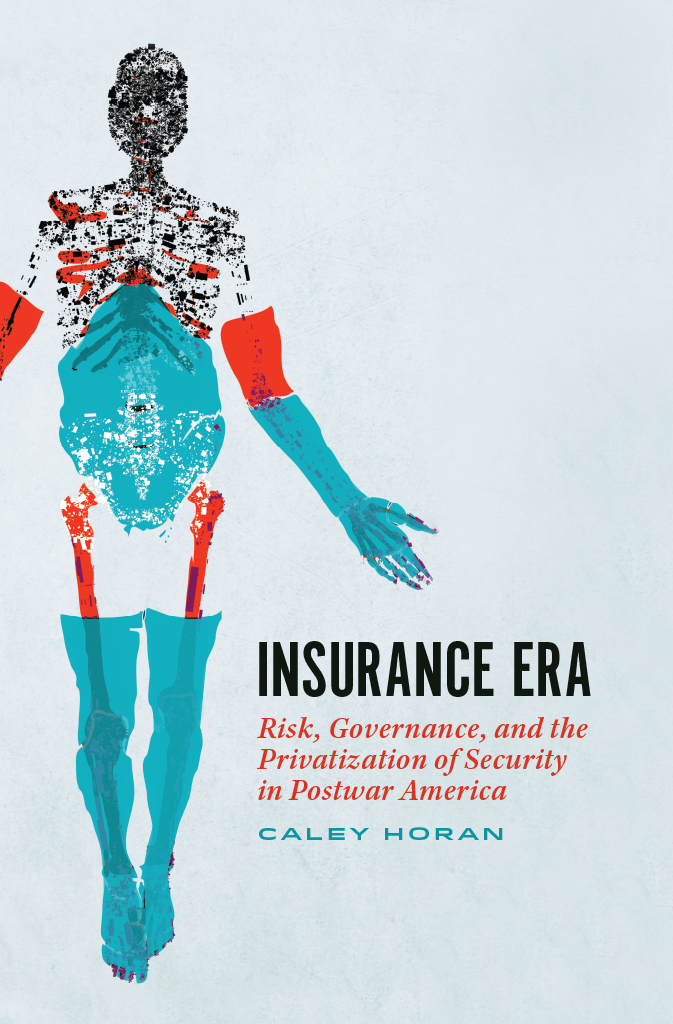
Insurance Era
Insurance Era
Risk, Governance, and the Privatization of Security in Postwar America
CALEY HORAN
The University of Chicago Press
Chicago and London
The University of Chicago Press, Chicago 60637
The University of Chicago Press, Ltd., London
2021 by The University of Chicago
All rights reserved. No part of this book may be used or reproduced in any manner whatsoever without written permission, except in the case of brief quotations in critical articles and reviews. For more information, contact the University of Chicago Press, 1427 E. 60th St., Chicago, IL 60637.
Published 2021
Printed in the United States of America
30 29 28 27 26 25 24 23 22 21 1 2 3 4 5
ISBN -13: 978-0-226-78438-0 (cloth)
ISBN -13: 978-0-226-78441-0 (e-book)
DOI : https://doi.org/10.7208/chicago/9780226784410.001.0001
Library of Congress Cataloging-in-Publication Data
Names: Horan, Caley, author.
Title: Insurance era : risk, governance, and the privatization of security in postwar America / Caley Horan.
Description: Chicago ; London : The University of Chicago Press, 2021. | Includes bibliographical references and index.
Identifiers: LCCN 2020051200 | ISBN 9780226784380 (cloth) | ISBN 9780226784410 (ebook)
Subjects: LCSH : InsuranceUnited StatesHistory20th century. | InsurancePrivatizationUnited States. | United StatesHistory1945 | United StatesCivilization1945
Classification: LCC HG 8531 . H 67 2021 | DDC 368.00973/09045dc23
LC record available at https://lccn.loc.gov/2020051200
 This paper meets the requirements of ANSI/NISO Z 39.48-1992 (Permanence of Paper).
This paper meets the requirements of ANSI/NISO Z 39.48-1992 (Permanence of Paper).
For
Jee-Yeon Jay Kim
Contents
The significance of a business is not wholly an affair of its statistics.
WALLACE STEVENS , Insurance and Social Change
In 1937, two years after the passage of the Social Security Act and the birth of the American welfare state, Wallace Stevens contemplated the future of insurance. In Insurance and Social Change, an essay penned for the Hartford Accident and Indemnity Companys monthly magazine, the famed modernist poet surveyed the rapidly changing social landscape in Europe and the United States and noted an upsurge in demands for social and economic security. As the social mass seeks to maintain itself, it relies more and more on insurance, he mused. The truth is that we may well be entering an insurance era.
Though best known for his poetry, Stevens was no stranger to the world of insurance. He worked in the field of surety and fidelity claims for most of his adult life and served as executive vice president at the Hartford for more than two decades. One of only a handful of published texts in which the poet discusses his day job, Insurance and Social Change addresses a question that first emerged as a topic of heated debate in the United States during the 1930s, and remained so for the rest of the century: What level of social and economic security should Americans expect, and how should they attain it?
Insurance and Social Change begins with a vision of a world in which insurance [has] been made perfect. In this utopian future, insurance would guarantee protection for everyone against everything. Could such a world be possible? Was it already in the process of becoming? To answer these questions, Stevens looked abroad, to Europe, where political change and public pressure for social insurance programs had been most acute. After surveying the state of the field in Italy, Germany, England, and Soviet Russia, Stevens concluded that perfect insurance was still a long way off. The problem, according to Stevens, was nationalization, the replacement of private insurance providers with government programs. Demand for social and economic security had become so great in parts of Europe that governments there had begun embracing insurance to what Stevens called a point approaching identity. Stevens viewed this developmentthe rise of the welfare states of Europewith alarm.
Stevens was not alone in fearing the welfare state. Many American conservatives and business leaders in the 1930s believed that New Deal programs like Social Security represented the first step toward full-scale socialization of private enterprise. Unlike most of his colleagues in the insurance industry, however, Stevens was willing to remain optimistic. In the coming insurance era, he reckoned, public insurance programs of one sort or another would be inevitable. Social Security was but a minor case, the leading edge of a manageable tide that, if kept in check, might lift all boats. Once Americans developed an attachment to basic coverage of the sort now offered by government old age and unemployment programs, new forms of insurable security would no doubt come into view. Universal insurance, or insurance for all, is not the same thing as insurance for everything, Stevens reassured his nervous colleagues in the industry. Public welfare programs, so long as they were limited, might even serve private providers by helping to expand desire for security and new insurance products.
To prevent nationalization, Stevens argued, private industry would need to collaborate with government. But collaboration would not be possible if robust public insurance schemes, of the sort that were proliferating in Europe, took root in the United States. To prevent this very real possibility, Stevens urged his colleagues in the insurance industry to work together to ensure that the American welfare state remain limited. If private companies can continue to expand with profit and adapt to the changing needs of changing times, he declared confidently, no question of nationalization is likely to arise under our system. Stevenss appeal did not fall on deaf ears. Though not all leaders of the insurance industry shared his willingness to adapt to Social Security, nearly all agreed that a growing welfare state intent on providing security to its citizens was a serious threat. Confronted by a global trend toward socialized risk, Wallace Stevens and other leaders of the insurance industry assessed their options. The coming insurance era signaled danger, but could it also present an opportunity? By unifying, expanding, and adapting, could private insurers shape this new era, and perhaps even make it their own?
An Insurance Era
This book examines the marketing, investing, and underwriting activities of select segments of the private insurance industry in the United States as it confronted the threat of government incursion and worked to adapt to what Stevens called the changing needs of changing times during the mid-decades of the twentieth century. Stevenss poetic heralding of an insurance era provides the launching point for this study, but the poet-businessman was not the first, or last, thinker to imagine the twentieth century in these terms.
The era Stevens saw on the horizon had already begun to emerge by the 1930s. During the early years of the twentieth century, a great number of American intellectualsfrom economists seeking solutions to the rise of industrial accidents, to pragmatists hoping to tame chance and end warturned to the social sharing of risk as a powerful response to the uncertainties and dangers unleashed by industrial capitalism. The promise of insuranceits ability to produce social stability by spreading risk across populationsalso attracted the interest of governments. The rise of the modern welfare state, a twentieth-century development, fundamentally transformed the relationship between states and their citizens. This turn toward the socialization of risk was a process Stevens hoped to contain, as it was already well underway when he penned Insurance and Social Change.
Next page
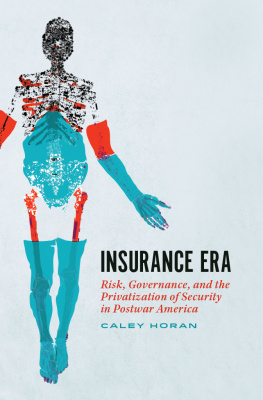

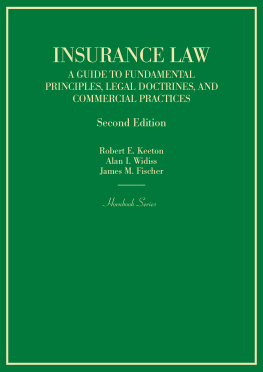
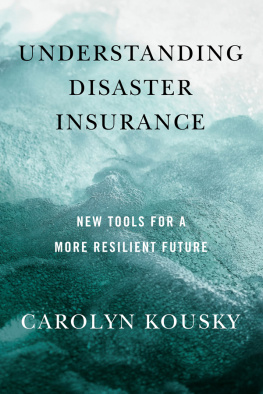


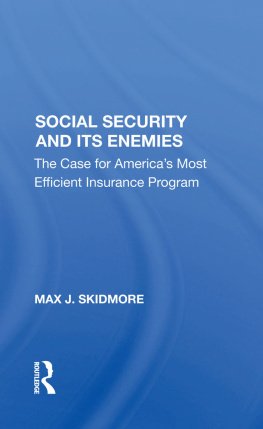

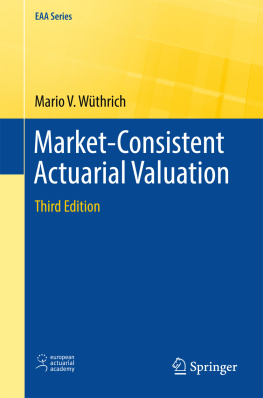


 This paper meets the requirements of ANSI/NISO Z 39.48-1992 (Permanence of Paper).
This paper meets the requirements of ANSI/NISO Z 39.48-1992 (Permanence of Paper).